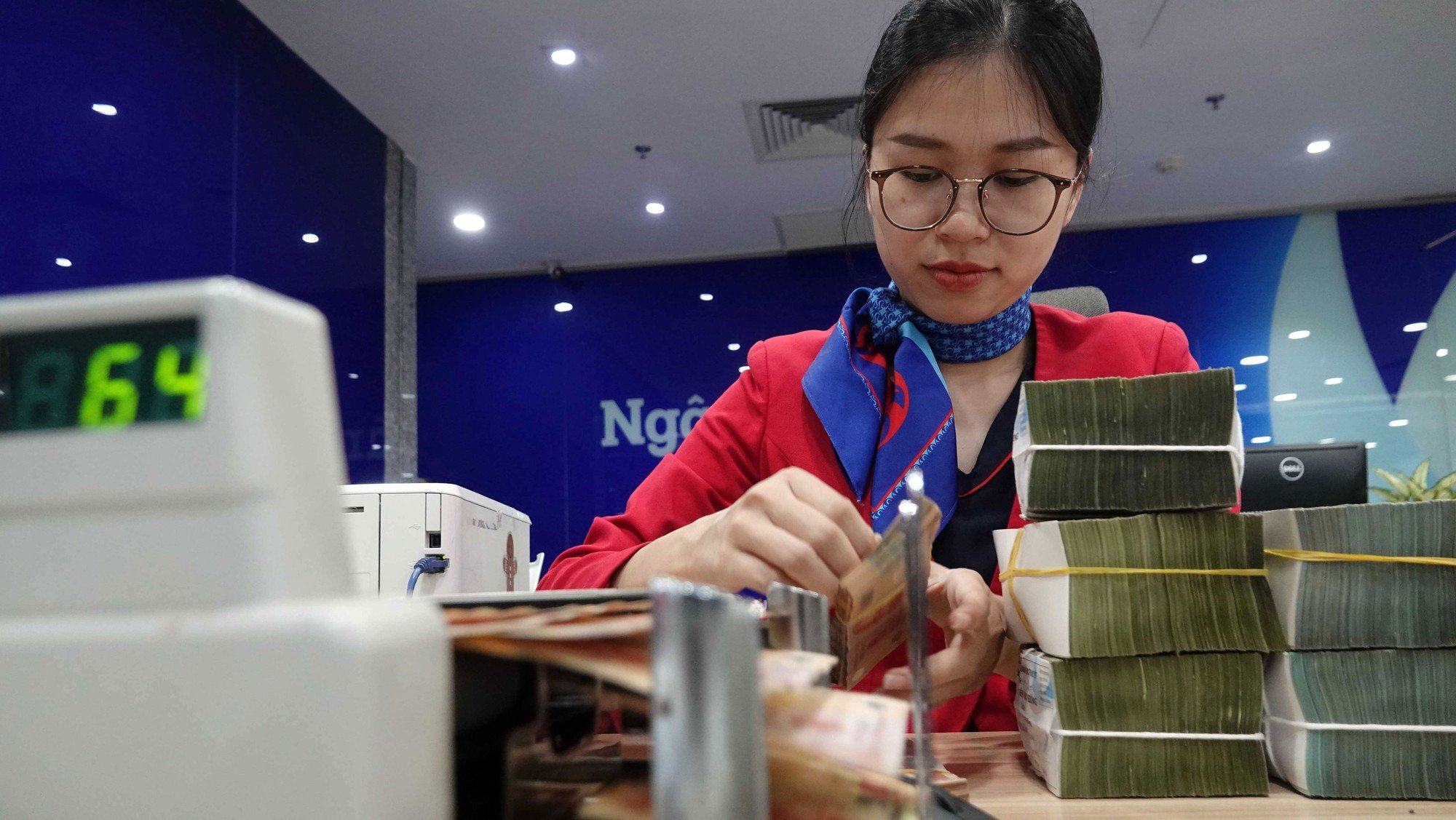Many loan packages with reduced interest rates are appearing.
In contrast to the situation a year ago when banks ran out of credit limits, leading to a blockage of credit flows, a series of loan packages with preferential interest rates are now available. State-owned commercial banks have been at the forefront of reducing lending interest rates, with reductions ranging from 0.5% to 1% per year.
For example, Vietcombank offers short-term production and business loans to individual customers and household businesses to supplement working capital for production and business activities at interest rates of 7.5%/year for loans with a term of less than 3 months; 7.8%/year for loans with a term from 3 to less than 6 months; 8.3%/year for loans from 6 to less than 9 months; 8.6%/year for loans with a term from 9 to less than 12 months; and 8.8%/year for loans with a term of 12 months. VietinBank also recently announced preferential loan interest rates starting from only 7.1% to support the production and business needs of individual customers. BIDV offers production and business loans with interest rates starting from 7%/year…

Lending interest rates are gradually decreasing.
Many joint-stock commercial banks are also joining the wave of interest rate reductions. For example, Ban Viet Bank is cooperating with Responsibility Fund Management Company (Switzerland) to launch the "Green Credit" program with preferential loan interest rates starting from only 8.9%/year. The program has a limit of 500 billion VND for production, business, and consumption projects that are environmentally friendly or aimed at protecting the environment and society.
Previously, Viet Capital Bank had implemented a series of programs such as the "Combo 3 Offers" loan package with a maximum interest rate reduction of up to 2%/year, the "Flexible 24-Hour Loan" product with same-day disbursement for urban businesses and a preferential interest rate of 10.5%/year... Or SeABank reducing interest rates by up to 1%/year for existing and new loans.
Specifically, SeABank adjusted interest rates down by 0.5%/year for all existing individual customer loans. For new secured loans, interest rates were reduced by 0.7 - 1%/year, with the highest reduction of 1%/year applied to short-term loans under 6 months. Notably, SeABank allocated VND 3,450 billion to implement a preferential interest rate program starting from 9.29%/year for consumer loans to purchase houses and cars. LienVietPostBank allocated VND 15,000 billion for loans with interest rates reduced by 0.5 - 1% from now until September 30th, including VND 5,000 billion for businesses and VND 10,000 billion for individuals.
Interest rates on loans are gradually decreasing.
According to the State Bank of Vietnam, as of April 28th, outstanding credit to the economy was over 12.28 million billion VND, an increase of 3.05% compared to the end of 2022 and a 9.78% increase compared to the same period last year. Thus, banks injected approximately 1% of credit into the market in April, equivalent to 118,000 billion VND. The credit growth rate in the first four months of 2023 is less than half of that in 2022. In Ho Chi Minh City alone, credit growth in April increased by 0.65%, a decrease compared to the 1.37% increase in March.
High interest rates in the early months of the year caused a slowdown in lending. In Q1 2023, Vietcombank's outstanding loans increased by only 2.5%, reaching approximately VND 1,165 trillion; deposits increased by 3.1% compared to the end of 2022. Compared to Q1 2022, Vietcombank's credit growth in Q1 2023 was only about one-third, while deposits remained roughly the same. At BIDV, by the end of Q1 2023, outstanding loans reached over VND 1.57 trillion, with credit growth slightly higher than last year at 5%; deposits reached over VND 1.65 trillion, a growth of 2.3%. ACB's credit growth decreased slightly by 0.6% compared to the beginning of the year.
Mr. Nguyen Thanh Tung, General Director of Vietcombank, stated that the rate of lending to businesses and individuals has decreased compared to before the increase in interest rates, with loans to individuals for purchasing houses and land declining. Following the decision to reduce lending interest rates in the first four months of the year, Vietcombank recently decided to further reduce interest rates by 0.5% per year until July for over 600,000 billion VND in outstanding loans to approximately 110,000 customers. To provide a basis for further interest rate reductions in the coming period, Vietcombank, along with several other large banks, has planned to further reduce deposit interest rates in May to create a foundation for reducing lending interest rates. The projected reduction in deposit interest rates is an additional 0.3% per year in May.
Interest rates have fallen, but not enough | Economic Trends
Speaking at the 2023 Banking Overview Forum themed "Managing Monetary Policy in the Face of Global Economic Variables," organized by the State Bank of Vietnam (SBV) and Saigon Economic Magazine on May 10th, Dr. Can Van Luc, Chief Economist of BIDV, stated that in 2023, thanks to a good supply of foreign currency from remittances; stable FDI disbursement; and a significant reduction in the hoarding of USD due to higher VND interest rates compared to USD, attracting depositors to convert their savings to VND… the SBV has purchased foreign currency to increase foreign exchange reserves, thus easing exchange rate pressure in 2023. The expert assessed that monetary policy should shift from a cautiously tight to a cautiously easing stance to support growth; reduce interest rates, increase access to capital, restructure debt, and support liquidity, while accelerating the restructuring of banks. However, Mr. Luc also noted that the current situation of abundant "cheap money" will no longer be the same as before because the picture of the global economy has changed after the Covid-19 pandemic.
Although banks have accelerated interest rate reductions, experts believe current rates are still high compared to the health of the business community. In particular, the first-quarter profit picture, with numerous banks raking in soaring profits amidst a difficult economic climate, remains controversial, with public opinion suggesting a lack of genuine sharing of burdens between banks and the people and businesses – their own customers. Therefore, lending rates must continue to be lowered to support production and boost purchasing power in the market.
Reduce interest rates on social housing loans.
On May 10th, the Prime Minister signed Decision 486 on the preferential lending interest rate at the Social Policy Bank applicable to loans with outstanding balances for purchasing, leasing, or renovating social housing, at 4.8% per year (a reduction of 0.2% compared to the previous rate). This interest rate is applicable from May 10th, 2023 to December 31st, 2024.
Source link













































































































Comment (0)